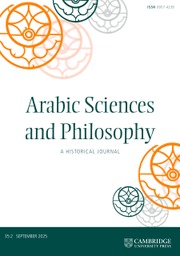No CrossRef data available.
Article contents
CORRECTING PTOLEMY AND ARISTOTLE: IBN AL-ṢALĀḤ ON MISTAKES IN THE ALMAGEST, ON THE HEAVENS, AND POSTERIOR ANALYTICS
Published online by Cambridge University Press: 17 August 2022
Abstract
The polymath Ibn al-Ṣalāḥ (d. 1154 CE) is known for a number of comparatively small treatises on specific aspects of ancient Greek mathematical and philosophical works. He devotes many of his works to greater or smaller errors that he found in the works by Euclid, Ptolemy, and Aristotle. The aim of the present paper, which focuses on three treatises on Ptolemy and Aristotle, is to describe Ibn al-Ṣalāḥ’s method and aim in these works. I argue that his treatises on the Almagest, On the Heavens, and Posterior Analytics follow a similar structure and that there is much value for modern research resulting from the bibliographical details provided by Ibn al-Ṣalāḥ. To give but just one example, Ibn al-Ṣalāḥ attests to the existence of a so far unknown Arabic translation of Aristotle's Posterior Analytics. In this way, this paper is the first to establish Ibn al-Ṣalāḥ’s research profile: his works tell us which sources were available to scholars active in Baghdad and Damascus in the 12th century CE and how he tried to resolve contradictions from the different versions of authoritative texts. Thus, this paper enhances our knowledge of the Graeco-Arabic transmission of scientific and philosophical texts.
Résumé
Le savant Ibn al-Ṣalāḥ (m. 1154) est connu pour ses petits traités portant sur des questions particulières d'ouvrages mathématiques et philosophiques grecs. Il consacre plusieurs de ses travaux aux erreurs, plus ou moins importantes, qu'il trouve dans les travaux d'Euclide, de Ptolémée et d'Aristote. Le but de cet article, qui se concentre sur trois traités de Ptolémée et d'Aristote, est de décrire la méthode d'Ibn al-Ṣalāḥ et les objectifs qu'il poursuit dans les traités en question. Je suggère que ses traités sur l’Almageste, le Traité du ciel et les Seconds analytiques suivent une structure semblable et qu'ils sont d'une grande valeur pour la recherche moderne en raison des éléments bibliographiques fournis par Ibn al-Ṣalāḥ. Pour ne citer qu'un exemple, Ibn al-Ṣalāḥ atteste de l'existence d'une traduction arabe des Seconds analytiques d'Aristote inconnue jusqu'ici. Cet article établit ainsi pour la première fois le profil de savant d'Ibn al-Ṣalāḥ : ses travaux nous disent quelles sources étaient disponibles aux savants actifs à Bagdad et Damas au XIIe siècle et comment il a tenté de résoudre les contradictions entre les différentes versions des textes faisant autorité. Cet article offre donc une contribution à notre connaissance de la transmission gréco-arabe des textes scientifiques et philosophiques.
- Type
- Research Article
- Information
- Copyright
- Copyright © The Author(s), 2022. Published by Cambridge University Press


